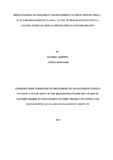| dc.contributor.author | ASIIMWE, George | |
| dc.contributor.author | Wahitu, Fred (Supervisor) | |
| dc.contributor.author | BAGAMBE, Henry (Supervisor) | |
| dc.date.accessioned | 2017-05-16T12:12:11Z | |
| dc.date.available | 2017-05-16T12:12:11Z | |
| dc.date.issued | 2015 | |
| dc.identifier.citation | APA | en_US |
| dc.identifier.other | 13/MMS PPM/31/046 | |
| dc.identifier.uri | http://hdl.handle.net/20.500.12305/106 | |
| dc.description | A Dissertation Submitted to the School of Management Science in Partial Fulfilment of the Requirements for the Award of Master’s Degree in Management Studies (Project Planning and Management) of Uganda Management Institute | en_US |
| dc.description.abstract | This study was carried out to examine whether the Results Based Management strategy (RBM) adopted by Heifer International/Uganda Domestic Biogas Programme, significantly contributed to the number of households that were satisfied with their biodigester installations as well as the services of the biogas actors. The research objectives were to examine the relationship between RBM that included; Capacity building process, involvement of stakeholders in the Strategic Planning, Implementation Monitoring process and household satisfaction.
A Correlational study design was adopted to examine the relationship between RBM and Household satisfaction. Data was got from a total of 350 respondents. Quantitative data was got by using close ended questionnaires on a 5 point likert scale from 235 households. In order to triangulate this data, 70 biogas promoters and 31 Masons were also subjected to questionnaires so as to get statistically significant data. Qualitative data was got by using structured Observation Checklists for the 235 households and Key informant Interviews (14) for purposes of corroboration. Qualitative data was systematically organised under themes and analysed for content where as quantitative data was analysed using SPSS package to generate both descriptive and inferential statistics.
Spearman’s Correlation coefficient was run but only capacity building and Implementation processes were found to have a positive significant relationship on Household satisfaction (P<_0.000). Similarly, the relationship was indicated by regression analysis. This was further confirmed by multiple linear regression analysis that indicated that RBM contributed only 11.3% to Household satisfaction; thus 88.7% was contributed by other factors that were not included in this study. Based on the findings, there is need to create an enabling environment through; participative policy formulation, capacitating MFIs, provision of subsidy, building internal capacity of biogas Institutions and enforcing accountability. | en_US |
| dc.language.iso | en | en_US |
| dc.publisher | Uganda Management Institute | en_US |
| dc.subject | Results Based Management | en_US |
| dc.subject | Household Satisfaction | en_US |
| dc.subject | Small Scale Biodigesters | en_US |
| dc.subject | Uganda Domestic Biogas Programme | en_US |
| dc.subject | Heifer International | en_US |
| dc.title | Results Based Management and Household Satisfaction by Small Scale Biodigesters in Uganda: A Case of Heifer International/ Uganda Domestic Biogas Programme in Western Region | en_US |
| dc.type | Thesis | en_US |

